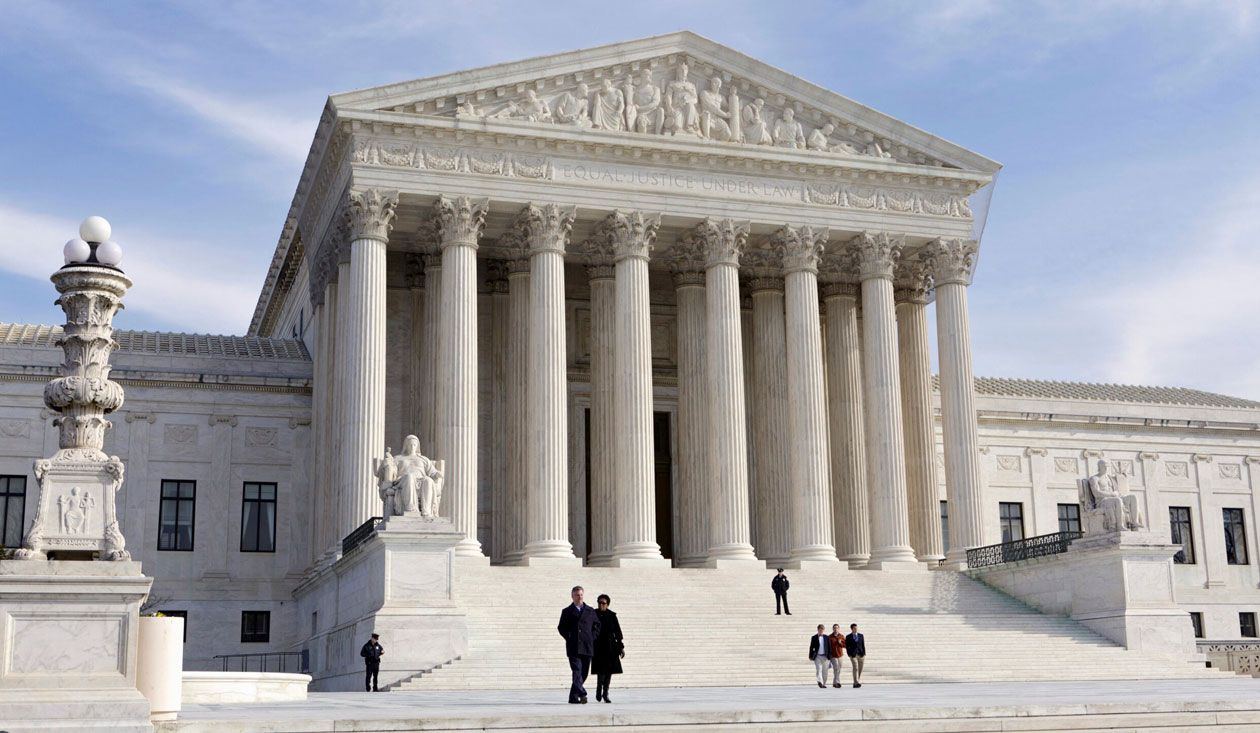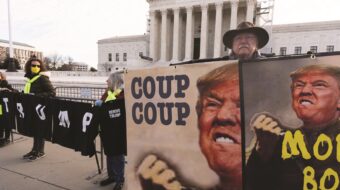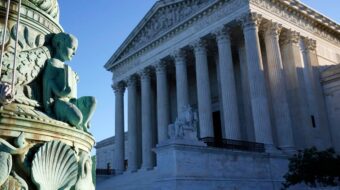
The Supreme Court is back on the job today determined to wage a war against democracy in the United States. What it did last year by overturning Roe v. Wade was only the beginning of what will be a right-wing scorched earth campaign by the highest Court in the land.
The Roe decision, a decision to allow increased gun violence, and decisions to allow prayer in all kinds of public places were only the tip of the iceberg the right-wing justices are about to float above the water level.
In the process of revoking abortion rights, Justice Samuel Alito dismissed the rights of anyone the white landed aristocracy who wrote the U.S. constitution did not include in the document. Racism, misogyny, and right-wing logic will be used in an attempt to thrust the country back into the days of the 1850s.
The right of everyone to vote, a major improvement made in the United States since the days of rule by the old landed aristocracy, is itself now in danger from this Court.
If Republicans win in the coming midterm elections they will appeal to the Court to back their attacks on voting rights. How do we think the Court, which has already backed racist gerrymandering, will rule in those cases?
The right-wing majority on the Supreme Court has already crushed voting rights and attempts to end racist gerrymandering so that a legitimate popular vote is next to impossible in many places. They can be expected to go further.
The Court could end up being the Republican backup plan to end free elections. They may simply have to allow Republican-controlled state legislatures to do the dirty work at the state level. The critical case coming up is one that tests the “independent state legislature” theory, which says that state legislatures, not the voters, get to choose the state’s representatives in Congress.
Fairness and justice will be of no concern to the Supreme Court’s right-wing majority. This term will feature the destruction of affirmative action, a particularly awful ruling given that it will be coming up during the first term of Justice Ketanji Brown Jackson, the first Black woman to serve as a Supreme Court justice. She will be joining two other Court progressives fighting hard to stop the right-wing assault.
This term will also see attacks on LGBTQ rights, same sex marriage, tribal sovereignty, and, of course, any programs that attempt to address climate change or the destruction of the environment.
In a true democracy, the voters are supposed to elect representatives, and those representatives are supposed to pass laws within constitutional bounds as interpreted by impartial judges when necessary. Congress and the Judiciary are not equal in a true democracy. The Congress is primary because it contains the directly elected representatives of the people and the Courts are there to back up the democratically elected representatives of the people.
If the courts are prejudiced in favor of the rights of the ruling class minority they should be recalled. And there is no way to do this with the lifetime appointments on the Supreme Court. This is all the more reason to go out and vote in the Midterms to elect representatives who will be willing to fight to reform the Supreme Court.
The way it is now, Trump judges can accomplish by judicial ruling what Republicans cannot pass through the popular majorities that oppose their attacks on democracy.
We cannot have a situation whereby Congress passes legislation protecting abortion rights and the Court will strike it down. We cannot have a situation whereby congressional restoration of voting rights is followed by the Court striking it down. The same is true of gun safety laws, executive orders by the president achieving immigration reform and so many other issues.
Credibility on one-way dive downwards
With its credibility on a one-way dive downwards with the public at least one justice is preparing to hear at least four cases which, if the right-wing majority continues to vote in ideological lockstep, will seriously harm democracy in the United States.
Indeed, progressive and non-partisan groups are already sounding the alarm that if the justices rule for the right-wingers who brought it, Moore v Harper could, by itself, endanger that democracy.
Just over a year ago, in a speech at an institute named for Senate Republican leader Mitch McConnell, Justice Amy Coney Barrett declared “this court is not comprised of a bunch of partisan hacks.”
Although many final rulings will come later in the term, the discussions coming up much sooner will reveal how the Court is likely to rule. We knew well in advance of the actual ruling, for example, that the Court was going to strike down Roe v. Wade.
The ruling in the Moore case, which will occur next year, will go far towards proving or disproving the words of Justice Coney Barrett that she is not one of a bunch of partisan hacks.
Now, the court includes Justice Ketanji Brown Jackson. But the ascension of the first Black woman to the High Court doesn’t change the ideological makeup of the bench. She, with Justices Elena Kagan—the justice who’s raised public doubts about court credibility—and Sonia Sotomayor will be outvoted.
That’s because, accomplishing a long-held aim of the radical right, and their corporate backers, Biden’s Republican predecessor, Donald Trump, named three of the majority five: Neil Gorsuch, Amy Coney Barrett, and Brett Kavanaugh.
The three joined two extreme right holdovers, Clarence Thomas, now the court’s senior justice, and Samuel Alito, whom former classmates, professors, and mentors describe in a recent New Yorker profile as a bitter, mean individual hellbent on turning the clock back to the days of white-male domination of the U.S.
All of this came through when Alito wrote the Dobbs v Jackson Women’s Health Organization, the ruling this past summer which eliminated the constitutional right to abortion, and sent the justices’ already shaky credibility into the tank.
Yet in the first six weeks of this new court term, the justices, including another conservative, Chief Justice John Roberts, who is more concerned than the ideological five with institutional credibility, will hear more cases which will have a big public impact, rub the public the wrong way, or both.
And if the justices go with the right wing on the fourth case, Moore v Harper, they will—bluntly—put final control of elections in the hands of, and only of, state legislatures, many of which are Republican-gerrymandered. That one ruling could seal perpetual right-wing domination of government. Moore, which is from North Carolina, will come up for argument in December, at the earliest.
Before Moore, these notable cases come first:
- Merrill v Milligan. Years ago, the right-wing majority gutted the key Voting Rights Act section which said the federal government had to “pre-clear” voting changes in any state, county, or other political body with a history of discrimination. That ruling led to a raft of voter repression laws.
But the justices left in place a weaker VRA part, Section 2. It says that, after the fact, voting changes can be challenged as discriminatory. The Alabama NAACP and groups of Black ministers and voters did so when the Republican-gerrymandered state legislature drew a congressional map with only one majority-Black district among Alabama’s seven, though the state is 27% black. They said Blacks should have a shot at two seats. The 7th District is 55%-60%, Black. The rest of Alabama’s Blacks are drowned by white votes in three other congressional districts.
The NAACP and the Black voters won in lower courts. But the High Court majority said “no.” It ruled in the first three months of 2022 that redrawing the districts came too close to this year’s election. So Alabamans will vote under the old map. On October 4, the justices will hear the case on its merits.
Biden sides with the NAACP
The Biden administration sides with the NAACP and its allies. It says Section 2 “requires consideration of race only when plaintiffs have shown that pervasive racial politics would deny minority voters equal electoral opportunities,” which is the case in Alabama. If the justices rule for Alabama, that would “change the character” of that VRA section—a polite way of saying the ruling would gut it.
- Sackett v EPA, to be argued October 3. In the last term, the right-wing majority said the EPA went too far in interpreting the Clean Air Act to mean it could regulate the emissions that cause global warming. Now the justices will hear corporate arguments that contend the EPA goes too far in interpreting the Clean Water Act to cover almost all rivers, lakes, and streams—even ponds.
- Students for Fair Admissions Inc. v Harvard and the same group challenging the University of North Carolina. Both cases will come up on Halloween. The “Inc.” in the challengers’ name is the key. Both cases challenge the court’s affirmative action rulings of 1978, 2003, and 2013 saying race can be a factor, but not the controlling factor, in student admissions policies.
The group says it includes “more than 20,000 students, parents, and others who believe that racial classifications and preferences in college admissions are unfair, unnecessary, and unconstitutional.”
But back to the threat to democracy.
The advocates of the so-called “independent state legislatures” theory, which they base on one section of the U.S. Constitution, won’t admit that of course. But it’s easy to see how that would occur.
If a gerrymandered legislature writes election rules and nobody can overturn them, it can write rules—restricting voting, throwing out votes, certifying their party as the winners regardless of what the public actually wants—that in practical terms, keep itself and its ideological successors in power indefinitely.
“Adopting the ‘independent state legislature theory’ would mean voters across the country have no judicial remedy in state court or in federal court to fight partisan gerrymandering,” Eliza Sweren-Becker and Ethan Herenstein wrote in an August 29 analysis for the Brennan Center for Law and Justice.
“The potential consequences could stretch still further. The theory would throw elections into chaos,” they warn. That includes nullifying the idea of secret ballots, banning mail-in voting, and altering other “foundational state policies like the processes for voter registration,” while permitting laws approving voter suppression, even if state constitutions, like North Carolina’s, ban it.
And if the gerrymandered legislature doesn’t like an election’s outcome, under the independent state legislature theory, it could nullify it.
Needless to say, the radical right has already sent dozens of friend-of-the-court briefs to the High Court supporting the gerrymandered North Carolina legislature—and any legislature—in its unhindered right to write election rules in perpetuity. One came from the Republican National Committee and its two congressional campaign committees, piously denying the worst harms. But others weren’t as shy.
The American Legislative Exchange Council, a secret cabal of corporate chieftains and radical right lawmakers, bluntly quoted Justice Gorsuch in its friend-of-the-court brief. His words from a prior case summarize the right-wingers’ goal: “The Constitution provides that state legislatures—not federal judges, not state judges, not state governors, not other state officials—bear primary responsibility for setting election rules.”













Comments